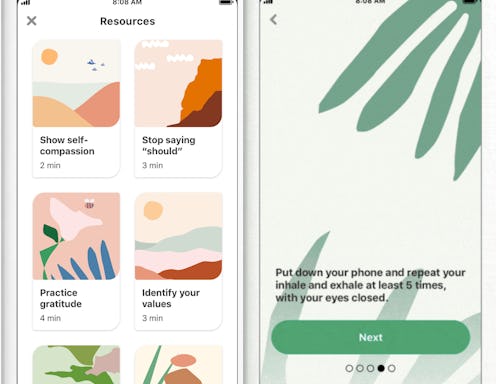Life
Pinterest Will Now Direct You To Self-Care Activities If You Search For Related Pins
Mental health resources, despite how necessary they are, can be hard to access. Different platforms are taking it into their own hands to help people find these resources. Now, Pinterest self-care activities are becoming available to users, the company announced in a blog post. The social media company has partnered with Brainstorm, the Stanford Lab for Mental Health Innovation, Vibrant Emotional Health, and the National Suicide Prevention Lifeline to create resources to help people learn how to "practice gratitude," "stop saying should," and other activities.
Inspired by the millions of users who use Pinterest to search for emotional health and related topics, Pinterest is launching this service as recognition that not all forms of inspiration center the next great summer vacation. Often, people need inspiration for tasks like getting out of bed in the morning, calming down in the middle of a stressful day, and working themselves down from a panic attack. According to TechCrunch, when users search for stress-related terms (like "work stress" or "anxiety tips", for example), they will be given the option to use the new, interactive stress-soothing activities.
These new activities — including deep-breathing and self-compassion exercises — will be privately available to users so that they can use them anonymously. And if they pass their phone to someone else after using the emotional health activities, users can rest assured: TechCrunch reports there will be no advertisements or suggestions based on their use of stress-soothing activities.
The rollout of this new product will happen over the coming weeks. When that happens, Pinterest will be joining a plethora of other social media websites and apps that are built for people with anxiety, depression, and other mental illnesses. The website and app The Mighty, for example, not only features user-written articles about their experiences with a wide intersection and variety of mental illnesses — it also has a feature that allows users to reach out to each other for help.
Currently, there are also DBT apps for people with Borderline Personality Disorder (BPD) and others who will benefit from (but cannot necessarily access) Dialectical Behavioral Therapy (DBT). Similarly, Rootd — a free app (with in-app purchases), available on both the AppStore and GooglePlay — focuses on helping people with anxiety that helps users track their needs by inviting them to explore how their bodies experience panic attacks.
The new rollout will also help reach populations who might not be inclined to download a dedicated mental health app. Pinterest has reported a 70% increase in users that are men between 2015 and 2016, bringing the total of users that are men to 40% of users. Given the stigma surrounding men seeking mental health assistance, this new feature can potentially help a lot of these male users get help they deserve in the privacy of an app that isn’t explicitly for mental health.
Unfortunately, a 2019 review of Pinterest user data as reported by Statistica does not account for how many Pinterest users are trans and/or non-binary. This is despite the fact that, beginning in 2015, Pinterest has a “custom” gender option in people’s profiles. But if the massive amounts of pins featuring genderqueer content and trans content is any indication, Pinterest may well have an abundance of trans and non-binary users looking to be seen. This is especially significant because trans and non-binary people — due to lack of access to health care and other forms of structural oppression, as well as lack of family support — can benefit greatly from mental health and wellness-focused apps.
Pinterest’s new wellness feature therefore has the potential to help many users who may not want to have an explicitly mental health-focused app on their phones. And this can be literally life-saving for users who are persistently failed by the American health care system, which doesn't guarantee adequate preventative and mental health care to the country’s most marginalized people. It remains to be seen how users will receive Pinterest’s new feature, but hopefully it will be able to serve the populations that need it most.
If you or someone you know is seeking help for mental health concerns, visit the National Alliance on Mental Health (NAMI) website, or call 1-800-950-NAMI(6264). For confidential treatment referrals, visit the Substance Abuse and Mental Health Services Administration (SAMHSA) website, or call the National Helpline at 1-800-662-HELP(4357). In an emergency, contact the National Suicide Prevention Lifeline at 1-800-273-TALK(8255) or call 911.
